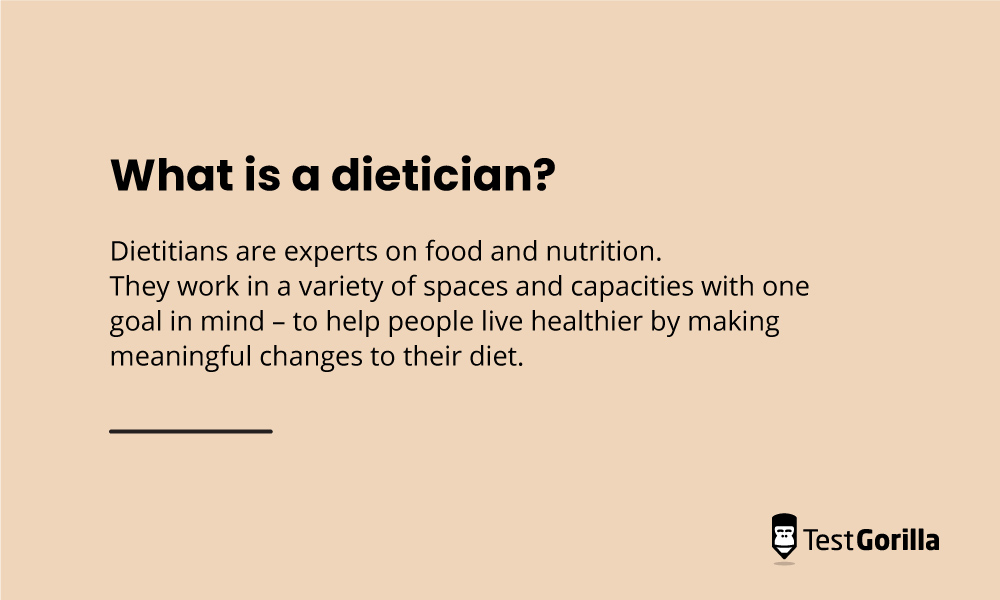All Categories
Featured
Table of Contents
The kinds of Nutritional experts are: and. The former are those individuals who utilize the clinical method to research nutrients, both as specific substances and as they connect in food and nutrition while the last are specialists that aid in identifying the nutritional problems of communities and in discovering remedies to those problems.
: They work with wellness programs and worldwide wellness organizations.: They are accountable for large-scale food planning and service.: They are experts in nutrition and aging. They are Board licensed in Gerontological Nourishment with the American Dietetic Association.: They are mainly entailed with nutritional related research study in the scientific facet of nutrition in illness states, public facet on main, second and sometimes tertiary health and wellness avoidance and foodservice aspect in concerns involving the food prepared for individuals.
The Best Senior Diet Optimization Service?
: These function as resource people for the media. Dietitians' experience in nutrition is usually taped for TV, radio, and papers-- either as an expert visitor point of view, normal writer or visitor, or for source, dining establishment, or dish development and critique.: These work under private method. As clarified above, all dietitians are nutritional experts but not all nutritional experts have the credentials and certifications to be called dietitians.
This means exactly the same point as Registered Dietitian (RD), a term that has actually been in usage for a long time. While certification to become an RD or RDN is controlled by the Academy of Nutrition and Dietetics a national company licensure is controlled by individual states.

In order to offer medical nourishment therapy and qualify as service providers for insurance firms, a dietitian must be certified by the state. According to the Bureau of Labor Statistics, the demand for dietitians and nutritionists is expected to increase by 20% in between 2010 and 2020 this is a much faster development price than the standard for all occupations.
A Better Family Nutritionist?
There are significant distinctions in settlement based upon field of expertise, with Medical Pediatric Dietitians and Dairy products Nutritionists averaging approximately $90,000. In 2014, The Bureau of Labor Data (BLS) found that the top 10% of dietitians and nutritional experts make more than $79,000, and the lower 10% less than $36,000 - Pediatric Diet Planning. A mean hourly wage of $27.62 was calculated for both fields, with the top 10% earning over $38.00 per hour, and the lower 10% earning below $17.00 per hour

Nonetheless, there is a selection of jobs available in different settings for those who wish to collaborate with the general public, in addition to for those who favor more research-focused work. Several enter into one of these fields in order to help people live much healthier lives which can be greatly gratifying.
With present statistics that one-third of the united state population is overweight, in addition to a large number of elderly U.S. residents, dietitians and nutritionists are most likely to have an extra comprehensive role in the future. My Plan places dietitians and nutritionists at # 53 in their joy index of leading 300 occupations with the greatest job satisfaction rankings.
Along with attending an approved program, a lot of states require dietitians to be licensed or to have specialist accreditation, or both. On the other hand, only concerning fifty percent of states require such credentials for nutritionists. Even so, lots of professional functions for nutritionists require at the very least a bachelor's degree, and the same accreditation is offered for nutritional experts and dietitians alike.
What Does Functional Diet Planning Cost?
Your core classes might consist of: Food science Chemistry Health treatment policy Clinical nourishment Biostatistics Microbiology Food service management You'll additionally require to finish a dietetic internship.

And to progress in the area, you'll likely need a master's level. So, whether written in legislation or otherwise, dietitians and nutritionists lot of times need a comparable education. Typical bachelor's levels for nutritional experts include nutrition scientific research or a relevant discipline, such as dietetics, kinesiology, food system monitoring, or biochemistry and biology. Some of your training courses could include: Fads in nourishment Biomedical data Clinical nourishment Food, nourishment, and habits Nutritional ecology Area nourishment Physiology Some level programs consist of internships, however in others you'll have to find chances by yourself.
The number of hours you'll need might depend on requirements in the state where you'll function. Whether you prepare to earn a credential or otherwise, it's an excellent idea to complete at the very least one internship to gain beneficial experience before looking for a full time function. Licensing and qualification needs for nutritionists and dietitians vary from state to state.
What Is The Best Gym Nutritionist Software?
A specialist qualification shows your experience and understanding in your area. These are not certification programs. A certificate indicates that you have taken a training program to discover a skill. Accreditation reveals your mastery expands past your education and learning which you have actually passed a certifying examination. Here are the top accreditations for dietitians and nutritionists.
The titles are basically the very same. There's no expert difference between them, and you're free to choose which one you wish to make use of based on individual choice. To take the accreditation exam, you should: Earn a bachelor's degree that's accredited by the ACEND Total a dietetics internship After Jan. 1, 2024, you'll need to gain a master's level to receive the certification.
Who Has The Best Nutritionist Service?
Bureau of Labor Stats puts dietitians and nutritionists in the very same category and states they make a typical annual wage of $69,680. However there is an array in wages, with the bottom 10% around $44,910 and the top 10% around $98,830, according to the BLS. Nutritional expert and dietitian roles are expected to expand 6.6% through 2032, according to the BLS.
This does not imply that career is premium to the various other, as they both have different functions and qualifications that may occasionally overlap. If you want to find out more about what makes these occupations unique, maintain reading. Diet professionals are professionals that assist boost the quality of life through healthy and balanced food options.
What Are The Best Best Nutritionist For Weight Loss Companies?
Nutritional expert recommendations about nutrition's influence on wellness. They assist individuals embrace healthier methods of eating and develop personalized plans based on objectives. Their services include dietary analysis and coaching, dish preparation and developing healthy and balanced consuming programs. Some have formal education and qualifications, others may have extra fundamental qualifications. The field is much less controlled than diet professionals; for this reason, nutritionists' levels of competence and certifications can vary.
There are numerous differences between dieticians and nutritionists. As their jobs breakthrough, numerous diet professionals seek advanced levels, like a Master's or Doctorate, to specialise in certain areas of nourishment.
Latest Posts
Performance Nutritionist (Marmion)
What Is The Best Fertility Dietitian Software?
How Much Should I Pay For Before After Body Transformation Services?